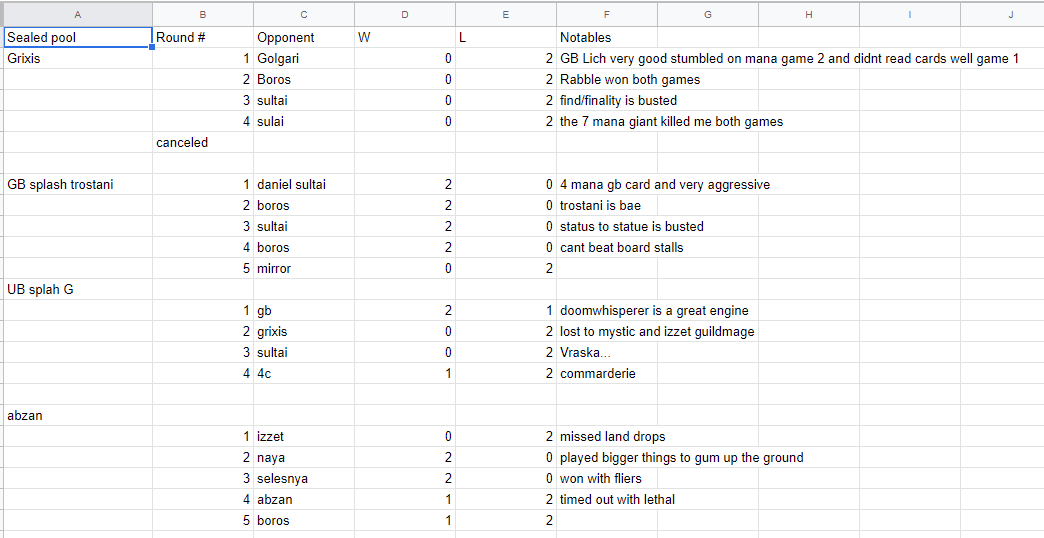Competitive Magic players spend most of their time preparing for tournaments. As you meet and talk with other competitors over the years, you will hear a wide variety of preparation styles and techniques. Now you get to hear mine.
Through my years of touring the Star City Games circuit, I have developed a strict regimen for preparing that I adhere to so I can insure my complete confidence on game day. The three main factors that should be acknowledged when preparing for tournaments are the deck’s reputation, data, and flexibility.
Repetition
The most obvious and straightforward way to prepare for a tournament is to playtest a chosen deck as much as possible. Many players have obligations outside of Magic that can inhibit the amount of time spent at local game stores, but with the various forms of media available to the public, playtesting has become even easier for those who seem to never have enough hours in the day. Arena and Magic Online enable testing at any time from the comfort of your own home.
Playtesting helps you become familiar with your cards and recognize possible lines of play. Building up repetitions with your deck helps you internalize how the deck works and what lines of play lead to the best outcomes. You don’t want to have to think through every situation in a tournament. Repetition gives you the experience to focus on the key moments.
Playtesting also allows the player to view a wide range of decks on the opposing side as well as the their sideboard strategies. You want to learn the reputations of other decks so you can regonize them more quickly and know what they are trying to do. But overall, it is most important to remember that not every week will result in a high number of wins, and to put faith in your practice. Even if you aren’t winning in your practice sessions, you can evaluate how the deck works and compare it to the results other people have had with the deck.
Data
After some amount of time, playtest games fade from memory. It can be hard to recall why you lost matches, what you need to improve, or which cards worked well. Taking notes can help save this information for later. Making a chart as you playtest will keep your memory refreshed, and doesn’t need to distract too much from playing.
For example, here is a chart I made while playtesting Guilds of Ravnica Team Sealed for Grand Prix Denver. It doesn’t take long to write down what decks you faced, the wins and losses, and any cards or plays that stood out. This process helped my team learn the format and focus on the powerful cards within our sealed pool.

A data chart can easily show a percentage of games lost versus won, notable cards, and adjustments made. That preserves the work you put into playtesting, and lets you slowly build a record of your play. Keeping track of a data sheet also helps you recognize your weaknesses. if you find yourself losing to one specific archetype frequently, go back to playtesting and focus on what can you can do differently to help secure more wins.
Flexibility
After playtesting and creating a spread of data, there is a lot of information to synthesize and evaluate. The biggest thing to take away from the other two steps of preparing is that it is important to stay flexible. Staying flexible while playing Magic allows you to try new strategies. Sometimes everything goes wrong, maybe you have to mulligan to a less than desirable number of cards or your opponent has some crazy sideboard tech against you. In those moments you must be flexible and work your way through the situation.Repetition through playtesting helps you practice being flexible. The more you can play, the more random and difficult situations you can stumble into. Those are perfect times to learn.
Flexibility allows you to take a stock archetype and add your own flair on it, making it your own. You can also try a new strategies, like choosing to be on the draw. It is much better to learn all these possibilities while playtesting than to try them on the fly in an event and hope they work. With enouh repetition in your playtesting, you can run through two leagues with a new sideboard arrangement, or swapping out cards in your main deck. Often you will find that the most popular builds will end up being better, but you gain flexibility by practicing with a variety of possible builds and sometimes uncover hidden gems.
Benjamin Franklin famously said, “by failing to prepare, you are preparing to fail.” Careful playtesting will make you better prepared for tournaments and better at Magic overall.
Zack is a SCG grinder with one ultimate goal: getting to the Players Champ. Based out of NYC, you can find him in other cities every weekend trying to hit that goal. When he isn’t traveling he streams. Follow his journey on Twitter!

